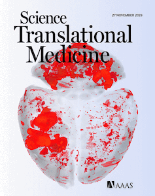
Science Translational Medicine
Scope & Guideline
Connecting Research to Real-World Impact.
Introduction
Aims and Scopes
- Translational research:
The journal is dedicated to publishing studies that translate findings from basic science into clinical applications, thereby facilitating the development of new treatments and diagnostic tools. - Mechanistic insights:
Papers often explore the underlying biological mechanisms of diseases, providing critical insights that can inform therapeutic strategies. - Innovative therapeutic approaches:
The journal highlights research on novel therapies, including gene editing, immunotherapy, and targeted drug delivery systems, fostering advancements in personalized medicine. - Multidisciplinary collaboration:
Research published in the journal frequently involves collaboration across disciplines, such as molecular biology, clinical medicine, pharmacology, and bioengineering, to address complex health issues. - Patient-centered research:
Emphasis is placed on studies that consider patient outcomes and experiences, ensuring that research is relevant and beneficial to those affected by diseases.
Trending and Emerging
- Immunotherapy and immune modulation:
A significant increase in research focused on immunotherapy, including CAR T-cell therapies and immune checkpoint inhibitors, reflects a broader trend towards harnessing the immune system for cancer treatment and other diseases. - Gene editing technologies:
The rise of CRISPR and other gene editing technologies has led to a surge in studies exploring their potential for treating genetic disorders, cancer, and infectious diseases. - Microbiome research:
An emerging focus on the role of the microbiome in health and disease is evident, with studies exploring how gut microbiota can influence immune responses and treatment outcomes. - Digital health and telemedicine:
The integration of technology into healthcare, including telemedicine and wearable health devices, is becoming increasingly prominent, reflecting the need for innovative solutions to healthcare delivery. - Long COVID and post-viral syndromes:
Research addressing the long-term effects of COVID-19, including mechanisms underlying long COVID, is gaining traction as the medical community seeks to understand and treat these emerging health issues.
Declining or Waning
- Traditional pharmacology:
Research centered around conventional drug discovery and development has seen a decrease, as the field shifts towards more innovative approaches such as personalized medicine and targeted therapies. - In vitro studies:
There is a noticeable decline in the publication of studies solely relying on in vitro models, as there is a growing preference for research that incorporates in vivo studies and human subjects to better reflect clinical realities. - Basic science without translational implications:
Papers that present purely basic science findings without clear translational pathways or implications for clinical application are becoming less common, as the journal focuses on research with direct relevance to patient care.
Similar Journals

Current Medical Science
Connecting Research to Clinical PracticeCurrent Medical Science is a prominent academic journal dedicated to advancing knowledge in the fields of Medicine, Biochemistry, and Genetics. Published by SPRINGER with an ISSN of 2096-5230 and E-ISSN 2523-899X, this journal is based in China and serves as a vital resource for researchers, professionals, and students alike. With a focus on innovative research and emerging trends, Current Medical Science has established itself with an impactful presence, operating under Open Access guidelines to ensure wide dissemination of scientific findings. The journal's recognition is underscored by its impressive Scopus rankings, including a Q3 quartile placement in Biochemistry and Genetics as of 2023. It is noteworthy that the journal spans converged years from 2018 to 2024, providing a comprehensive platform for scholarly discussions and developments that drive the evolution of medical science. As it continues to publish influential research, Current Medical Science plays an essential role in bridging the gap between laboratory science and clinical application.

Cell Reports Medicine
Pioneering the future of healthcare with cutting-edge insights.Cell Reports Medicine, published by Cell Press, represents a pivotal advancement in the open access landscape of biomedical research since its inception in 2020. With a dedicated focus on the intersection of medicine, biochemistry, genetics, and molecular biology, this journal has quickly established itself as a key resource, earning a remarkable Q1 ranking in these fields. Based in the United States, Cell Reports Medicine boasts impressive metrics, ranking #25 out of 636 in General Medicine and #18 out of 221 in Biochemistry, underscoring its influence and reach within the scientific community, with a notable 96th and 92nd percentile respectively. As a fully open access journal, it fosters global dissemination of knowledge, ensuring that groundbreaking research is readily available to researchers, professionals, and students alike. The journal not only promotes high-quality research but also aims to bridge the gap between molecular discoveries and clinical applications, making it an essential addition to any academic library or researcher's toolkit.
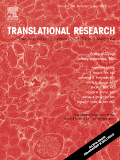
Translational Research
Transforming Science into Health SolutionsTranslational Research, published by Elsevier Science Inc, stands at the forefront of the rapidly evolving fields of biochemistry, medicine, physiology, and public health. With an impressive 2023 Q1 ranking in these categories, this journal has established itself as a critical platform for disseminating innovative research that bridges the gap between laboratory findings and clinical application. The journal, which has been converging knowledge since 2006, is committed to advancing scientific understanding and improving health outcomes by publishing high-quality articles that reflect rigorous peer review and impactful findings. With its impressive Scopus rankings, including a rank of #5 in Biochemistry and #7 in Physiology, it is an essential resource for researchers, practitioners, and students dedicated to the translation of scientific breakthroughs into real-world health solutions. Transitioning to an open-access model, the journal enhances accessibility and engagement, inviting a global audience to participate in the discourse shaping the future of healthcare and disease management.

TECHNOLOGY IN CANCER RESEARCH & TREATMENT
Unleashing the potential of technology in the fight against cancer.TECHNOLOGY IN CANCER RESEARCH & TREATMENT, published by SAGE Publications Inc, is a leading open-access journal dedicated to the intersection of technology and oncology. Since its inception in 2002 and with an impactful transition to open access in 2018, it has garnered attention for its commitment to disseminating groundbreaking research that explores innovative methodologies and technologies in cancer diagnostics and therapeutics. With ISSN 1533-0346 and E-ISSN 1533-0338, the journal is highly relevant in the fields of Cancer Research (Q3), Medicine (Q2), and Oncology (Q3), as indicated by its 2023 category quartiles. Its Scopus rankings further highlight its position within the research community, standing at #186 out of 404 in Medicine and #141 out of 230 in Cancer Research. Through a carefully curated selection of articles, this journal aims to bridge the gap between technological advancement and clinical application, providing a vital resource for researchers, healthcare professionals, and students striving to improve cancer treatment outcomes.

EBioMedicine
Pioneering research in genetics and molecular biology.EBioMedicine is an esteemed open-access journal published by ELSEVIER, dedicated to advancing the fields of biochemistry, genetics, and molecular biology, as well as medicine. Since its inception in 2014, EBioMedicine has established itself as a prominent platform for disseminating high-quality research, evidenced by its impressive rankings in Scopus, where it holds a Q1 category in both Biochemistry, Genetics and Molecular Biology and Medicine for 2023. With an exceptional impact factor that places it in the top percentiles (97th in Medicine and 93rd in Biochemistry), the journal is recognized for its rigorous peer-review process and its commitment to fostering scientific collaboration. Open access since its launch, EBioMedicine ensures that groundbreaking research is readily available to researchers, professionals, and students worldwide, enhancing knowledge dissemination and driving innovation in these crucial fields. For those seeking to stay at the forefront of biomedical research, EBioMedicine is an invaluable resource.

NEOPLASMA
Pioneering Insights in Neoplastic DiseasesNEOPLASMA is a prominent journal published by AEPRESS SRO, dedicated to the multifaceted field of oncology and cancer research. Since its inception in 1957, this esteemed publication has served as a vital platform for advancing the understanding of neoplastic diseases, disseminating high-quality research findings that contribute to clinical and laboratory advancements. Operating under a robust framework of peer review, NEOPLASMA holds significant credibility, as evidenced by its Q2 ranking in the Medicine (miscellaneous) category and Q3 rankings in both Cancer Research and Oncology for 2023. Furthermore, with an ISSN of 0028-2685 and E-ISSN 1338-4317, the journal fosters accessibility to valuable scientific content despite the absence of open access options. Positioned in Bratislava, Slovakia, NEOPLASMA continues to attract a global readership, making substantial contributions to the fields of biochemistry, genetics, and molecular biology as highlighted by its Scopus rankings. This journal is essential reading for researchers, professionals, and students looking to stay abreast of the latest developments in cancer research and treatment strategies.
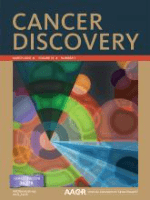
Cancer Discovery
Advancing the Frontiers of Oncology ResearchCancer Discovery, published by the American Association for Cancer Research, stands as a vital resource in the oncological research community, renowned for its commitment to disseminating groundbreaking studies and innovative findings in cancer biology, prevention, diagnostics, and treatment. With a significant impact factor reflecting its esteemed position, this journal facilitates open discussions and collaborations, striving to bridge the gap between experimental and clinical research. The journal, which has been active since 2011, is classified as a Q1 publication in 2023, underscoring its influence and authority in the realm of Oncology. By providing a platform for rigorous peer-reviewed articles, Cancer Discovery aims to advance our understanding of cancer and enhance therapeutic strategies, making it an indispensable tool for researchers, professionals, and students eager to stay at the forefront of cancer research.
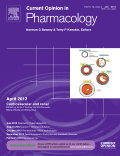
CURRENT OPINION IN PHARMACOLOGY
Exploring the Frontiers of Drug DiscoveryCurrent Opinion in Pharmacology, an esteemed journal published by Elsevier Science Ltd, encompasses the vital field of pharmacology and drug discovery. With a solid impact factor and recognized as a Q1 journal in both Drug Discovery and Pharmacology categories for 2023, it serves as a premier platform for researchers and professionals to share innovative insights, discuss emerging trends, and explore the complexities of drug development and therapeutic applications. Established in 2001 and running through 2024, this journal provides a critical overview of advances in the field, aiming to inform and inspire the next generation of pharmacological research. Despite lacking Open Access options, it maintains a high standard of scholarly excellence, ensuring that the content remains impactful and relevant to its readers. The journal is based in the Netherlands, representing a key contributor to the academic landscape in pharmacology.

Current Research in Translational Medicine
Advancing Medical Frontiers Through Innovative ResearchCurrent Research in Translational Medicine, published by ELSEVIER FRANCE-EDITIONS SCIENTIFIQUES MEDICALES ELSEVIER, is a dynamic open-access journal that has been at the forefront of innovative research since its inception in 2016. With a strong commitment to advancing the fields of biochemistry, hematology, infectious diseases, oncology, and transplantation, the journal provides an invaluable platform for researchers and practitioners to share novel findings that bridge laboratory discoveries and clinical applications. Currently recognized in prestigious categories such as Q1 and Q2 quartiles, this journal emphasizes the importance of translational science in improving health outcomes, supported by a rigorous editorial process and a commitment to high-quality research dissemination. Being listed in reputable databases like Scopus, it enables authors to reach a wide audience, ensuring that their impactful work contributes to the global dialogue on critical medical advancements. With its open access model, Current Research in Translational Medicine encourages widespread collaboration and engagement among the scientific community, solidifying its role as a leading journal in medicine and related fields.
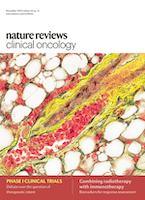
Nature Reviews Clinical Oncology
Pioneering Insights for Tomorrow's TreatmentsNature Reviews Clinical Oncology is a premier journal dedicated to the comprehensive exploration and critical evaluation of current advancements in the field of clinical oncology. Published by the esteemed NATURE PORTFOLIO in the United Kingdom, this influential journal boasts an impressive impact factor that reflects its significant role in shaping oncology research. As a Q1 ranked journal in Scopus, it occupies a notable position within the top tier of oncology publications, placing it in the 99th percentile among its peers. With a history of convergence from 2009 to 2024, it presents high-quality content through an open-access model, ensuring accessibility to vital research findings. Researchers, professionals, and students alike will find Nature Reviews Clinical Oncology an invaluable resource for staying abreast of the latest trends, biologic insights, and therapeutic innovations that drive the future of cancer treatment.